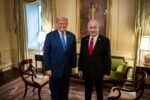During a recent meeting in Prishtina with Ukrainian journalists participating in the “Residency in Kosovo” program, Alexander Sushko, the Executive Director of the International Foundation “Renaissance,” shared his optimism about Kosovo’s recognition and its relevance to Ukraine.
Sushko, on his maiden visit to the Western Balkans, emphasized the significance of engaging with smaller Balkan nations like Kosovo. Despite their size, these nations possess valuable experiences in negotiating European and Euro-Atlantic integration, as seen in the case of Albania, and overcoming the aftermath of war, as evident in Kosovo’s journey. He particularly noted the importance of studying Kosovo’s experience in documenting war crimes and developing effective methodologies for such processes.
Drawing parallels between Kosovo’s aspirations and Ukraine’s trajectory, Sushko expressed confidence that Kosovo’s recognition could occur before the conclusion of Ukraine’s ongoing conflict. He attributed this optimism to Kosovo’s increasing integration into Europe, marked by recent achievements such as visa waivers with EU countries and negotiations for membership in the Council of Europe. However, Sushko acknowledged the significant hurdle posed by the “Serbian factor,” referring to Serbia’s claim over Kosovo and its occasional leveraging of ties with Russia.
Despite the diplomatic challenges at the intergovernmental level, Sushko emphasized the potential for cooperation between public organizations from both countries. He highlighted the need for increased exchanges of experiences and collaboration, which could serve as a catalyst for deeper engagement between Ukraine and Kosovo, especially at the NGO level.
Sushko concluded on an optimistic note, asserting that the path towards Kosovo’s recognition is inevitable. He viewed Kosovo’s prospective membership in the Council of Europe as a pivotal signal to European nations yet to recognize it.
The visit of Alexander Sushko to Kosovo is hoped to invigorate and strengthen contacts between public organizations of both nations, fostering mutual learning and cooperation in various spheres.







